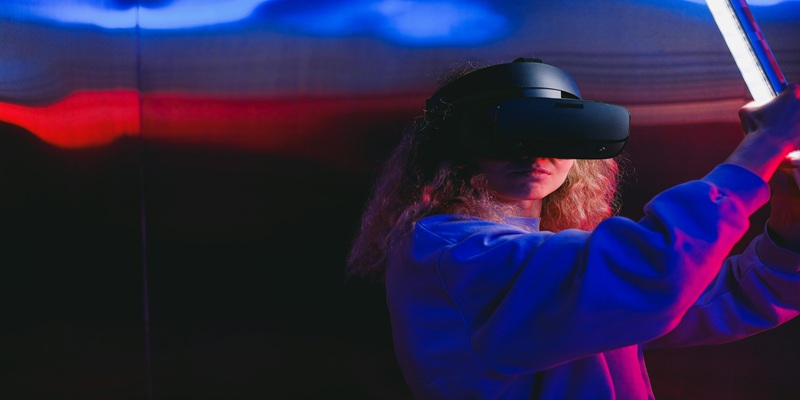The world of live entertainment is undergoing a seismic shift, and virtual reality (VR) concerts are at the forefront of this transformation. As technology continues to transform, the way we experience music and live performances is changing dramatically. Gone are the days when attending a concert meant battling crowds, expensive tickets, and long commutes. Instead, virtual reality concerts are emerging as a groundbreaking alternative, offering immersive experiences that are redefining the future of live entertainment.
What Are Virtual Reality Concerts?
Virtual reality concerts are live or pre-recorded performances that are experienced through VR headsets. These concerts transport viewers into a digital environment where they can watch their favorite artists perform as if they were physically present. The experience is highly immersive, combining 360-degree visuals, spatial audio, and interactive elements to create a sense of being in the same room as the performer.
Unlike traditional live streams, VR concerts allow fans to move around the virtual space, choose their viewing angles, and even interact with other attendees. This level of engagement is unparalleled, making VR concerts a unique and exciting way to enjoy live music.
The Rise of Virtual Reality Concerts
The concept of virtual reality concerts isn’t entirely new, but recent advancements in VR technology have made them more accessible and realistic than ever before. High-quality VR headsets like the Oculus Quest and PlayStation VR have brought immersive experiences into the homes of millions. Meanwhile, platforms like Wave and MelodyVR have partnered with major artists to host exclusive VR performances.
The COVID-19 pandemic also played a significant role in accelerating the adoption of VR concerts. With live events canceled worldwide, artists and fans alike turned to virtual alternatives to stay connected. Iconic performances by artists like Travis Scott in Fortnite and Billie Eilish in VR demonstrated the potential of this medium, attracting millions of viewers and proving that virtual concerts could be just as impactful as traditional ones.
Benefits of Virtual Reality Concerts
Virtual reality concerts offer a host of advantages for both artists and fans. Let’s take a closer look at some of the key benefits:
Accessibility for Fans
One of the most significant advantages of VR concerts is their accessibility. Fans no longer need to travel to a specific location or pay exorbitant ticket prices to see their favorite artists perform. Instead, they can enjoy the show from the comfort of their own homes. This is particularly beneficial for people with mobility issues, those living in remote areas, or fans who simply can’t afford the costs associated with traditional concerts.
Creative Freedom for Artists
For artists, VR concerts open up a world of creative possibilities. Performers are no longer limited by the constraints of physical venues. They can design fantastical stages, incorporate stunning visual effects, and even interact with fans in ways that would be impossible in a traditional setting. This creative freedom allows artists to deliver unforgettable experiences that push the boundaries of live entertainment.
Environmental Impact
Traditional concerts often come with a hefty environmental footprint, from the energy used to power massive stages to the waste generated by large crowds. Virtual reality concerts, on the other hand, are far more sustainable. By eliminating the need for travel and physical infrastructure, VR concerts reduce carbon emissions and contribute to a greener future.
Revenue Streams for Artists
VR concerts also provide artists with new revenue streams. Through ticket sales, merchandise, and virtual meet-and-greets, performers can monetize their virtual events effectively. Additionally, VR platforms often offer analytics that help artists understand their audience better, enabling them to tailor future performances to fan preferences.
Challenges Facing Virtual Reality Concerts
While the potential of VR concerts is undeniable, there are still some challenges that need to be addressed.
Cost of VR Equipment
Although VR headsets have become more affordable, they are still a significant investment for many people. This cost barrier can limit the accessibility of VR concerts, particularly for fans in developing countries.
Technical Limitations
Despite advancements, VR technology is not yet perfect. Issues like motion sickness, limited battery life, and the need for high-speed internet can detract from the overall experience. As technology continues to improve, these challenges are likely to diminish, but they remain a concern for now.
Lack of Physical Interaction
For some fans, the lack of physical interaction at VR concerts can be a drawback. The energy of a live crowd and the thrill of being in the same space as the artist are difficult to replicate in a virtual environment.
The Future of Virtual Reality Concerts
Despite these challenges, the future of virtual reality concerts looks incredibly promising. As VR technology becomes more advanced and affordable, we can expect to see even more innovative and immersive experiences.
Integration with Augmented Reality (AR)
The integration of augmented reality (AR) could take VR concerts to the next level. By blending digital elements with the real world, AR could allow fans to experience concerts in their own living rooms, creating a hybrid experience that combines the best of both worlds.
Social VR Experiences
Social VR platforms are already enabling fans to attend concerts with friends and interact with other attendees in real-time. This social aspect adds a new layer of engagement, making virtual concerts feel more like communal events.
Expansion Beyond Music
While VR concerts are currently focused on music, the technology has the potential to revolutionize other forms of live entertainment, such as theater, comedy, and sports. The possibilities are endless, and we’re only scratching the surface of what VR can achieve.
Conclusion
Virtual reality concerts are more than just a trend; they represent the future of live entertainment. By combining cutting-edge technology with the universal appeal of music, VR concerts offer a unique and immersive experience that is accessible, sustainable, and endlessly creative.
As the world continues to embrace digital innovation, virtual reality concerts will undoubtedly play a central role in shaping the future of how we experience live performances. Whether you’re a die-hard music fan or a casual listener, the era of VR concerts is here to stay—and it’s only going to get better from here. So, put on your VR headset, step into the virtual world, and get ready to experience live entertainment like never before. The future is now, and it’s sounding better than ever.



































